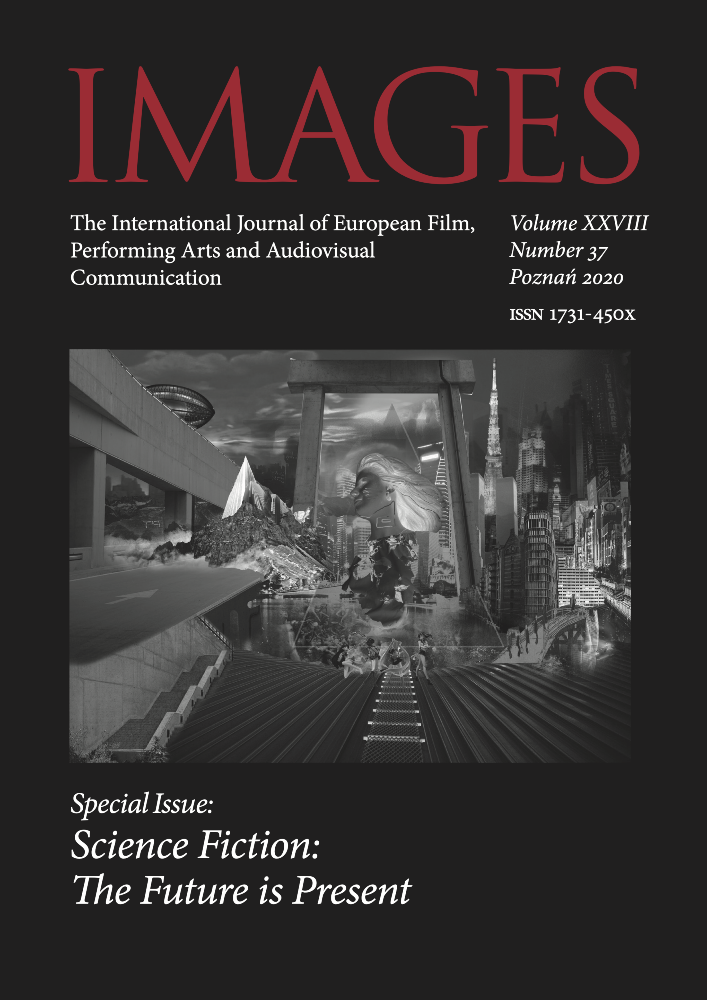Abstract
The article shows the growing interest of science fiction cinema in the human brain and related concepts, such as mind or consciousness. Nowadays, when distant space travel seems unreachable, artists find the exploration potential of the brain very promising. Thus, the main thesis of this analysis says that the brain has become for science fiction cinema the new universe. An excellent example of this paradigm shift is Inception (dir. Christopher Nolan, 2010). In the movie, the mind is depicted as a physical and accessible place, where we can find a lot of mysteries to solve. The characters travel to the deepest parts of subconsciousness because the processes inside the brain are the key to understanding and changing the real world. The article also shows how the director uses the achievements of science fiction cinema and, at the same time, that he postulates a new way of considering the issues relevant to modern neuroscience.
References
Baudrillard J., Symulakry i symulacja, przeł. S. Królak, Warszawa 2005
Booker K.M., Alternate Americas: Science fiction film and American culture, Westport, CT, London 2006
Booker M.K., Historical Dictionary of Science Fiction Cinema, Lanham, Toronto, Plymouth 2010
Boucher G., „Inception” breaks into Dreams, „Los Angeles Times” 4.04.2010, <https://www.latimes.com/archives/la-xpm-2010-apr-04-la-ca-inception4-2010apr04-story.html>, dostęp: 25.02.2020
Campbell J., Bohater o tysiącu twarzy, przeł. A Jankowski, Poznań 1997
Cornea Ch., Science Fiction Cinema. Between Fantasy and Reality, Edinburgh 2007
Ćwikiel A., Próba opisu ikonograficznego filmów science fiction, [w:] Panoramy i zbliżenia. Problemy wiedzy o filmie. Antologia prac śląskich filmoznawców, red. A. Gwóźdź, Katowice 1999
Dennett D.C., Consciousness Explained, New York, Boston, London 1991
Dukaj J., Podróż międzywymiarowa, czyli z biblioteki do kina i z powrotem. Wokół „Interstellar” Christophera Nolana, „Kultura Libaralna” 2014, nr 48 (308), <https://kulturaliberalna.pl/2014/12/02/jacek-dukaj-interstellar/>, dostęp: 20.02.2020
Film Genre Reader IV, red. B.K. Grant, Austin 2012
Flanagan O., Dreaming Souls. Sleep, Dreams, and the Evolution of the Conscious Mind, New York 2000
Gazzaniga M.S., Kto tu rządzi – ja czy mój mózg? Neuronauka a istnienie wolnej woli, przeł. A. Nowak, Sopot 2013
Grodecka A., Wstęp do tomu Pisarze i mózg, „Poznańskie Studia Polonistyczne. Seria Literacka” 2018, nr 34 (54)
Graham-Rowe D., World’s first brain prosthesis revealed, „New Scientist”, 3.12.2003, <https://www.newscientist.com/article/dn3488-worlds-first-brain-prosthesis-revealed/>, dostęp: 27.01.2020
Harnett E., Winglee R., Space and Space Travel, San Diego 2015
Holtsmark E.B., The „Katabasis” theme in modern cinema, [w:] Classical Myth and Culture in the Cinema, red. M.M. Winkler, New York 2001
Ilnicki R., Bóg cyborgów. Technika i transcendencja, Poznań 2011
„Inception” and Philosophy. Because It’s Never Just a Dream, red. D.K. Johnson, New Jersey 2012
„Inception” and Philosophy: Ideas to Die for, red. T. Botz-Bornstein, Chicago 2011 „Inception”: Interview With Director Christopher Nolan, „Collider Videos”, <https://www.youtube.com/watch?v=l8oyymCJi-A&t=13s>, dostęp: 1.03.2020
Jolin D., 2010 the year that... Christopher Nolan made our minds the scenes of the crime, „Empire” 2011, January, is. 259
Kłobukowski M., O pewnej tendencji kina popularnego, „Kwartalnik Filmowy” 2009, nr 66
Knapik R., Sztuczny Bóg. Wizerunki Technologicznej Osobliwości w (pop)kulturze, Poznań 2018
Koch Ch., A smart vision of brain hacking, „Nature” 1.09.2010, <https://www.nature.com/articles/467032b>, dostęp: 12.02.2020
Kortko D., Pietraszewski M., Cena nieważkości. Kulisy lotu Polaka w kosmos, Warszawa 2018
Magerstäd S., Body, Soul and Cyberspace in Contemporary Science Fiction Cinema: Virtual worlds and ethical problems, London 2014
Maleszyńska J., Staropolskie ogrody literackie, „Pamiętnik Literacki” 1984, z. 1 (75)
McGowan T., The Fictional Christopher Nolan, Austin 2012
Noë A., Out of Our Heads. Why you are not your brain, and other lessons from the biology of consciousness, New York 2009
Rupert R.D., Cognitive Systems and the Extended Mind, New York 2009 Tatarkiewicz W., Dzieje sześciu pojęć. Sztuka. Piękno. Forma. Twórczość. Odtwórczość. Przeżycie estetyczne, Warszawa 1988
The Philosophy of Christopher Nolan, red. J.T. Eberl, G.A. Dunn, Lanham, Boulder, New York, London 2017
The White House. President Barack Obama, <https://obamawhitehouse.archives.gov/BRAIN>, dostęp: 15.02.2020
Thorne K., Interstellar i nauka, przeł. B. Bieniok, E.L. Łokas, Warszawa 2015
Thorwald J., Kruchy dom duszy, przeł. W. Sawicki, Kraków 1994
Trafton A., Neuroscientists plant false memories in the brain, „MIT News” 25.07.2013, <http://news.mit.edu/2013/neuroscientists-plant-false-memories-in-the-brain-0725>, dostęp: 20.02.2020
Westfahl G., Space opera, [w:] The Cambridge Companion to Science Fiction, red. E. James, F. Mendlesohn, Cambridge 2003
Wickens A.P., A History of the Brain, From Stone Age surgery to modern neuroscience, London and New York 2015
Zawadzki P., Zarys filozoficzno-etyczno-społeczny implikacji rozwoju interfejsów mózg-komputer i mózg-mózg, [w:] Technokultura: transhumanizm i sztuka cyfrowa, red. D. Gałuszka, G. Ptaszek, D. Żuchowska-Skiba, Kraków 2016
Zimmerman R., Leaving Earth. Space Stations, Rival Superpowers, and the Quest for Interplanetary Travel, Washington 2003
License
Copyright (c) 2020 Marcin Kowalczyk

This work is licensed under a Creative Commons Attribution 4.0 International License.

